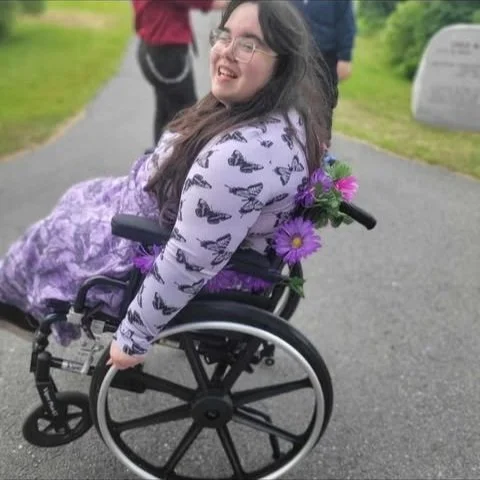Phoenix Lowe
Age: 19
Occupation: Student
WHAT ARE YOU STUDYING AND/OR WHAT ARE YOUR PROFESSIONAL AMBITIONS?
I’m currently finishing my last year of high school. Next year, I plan to begin my studies in Social Work and Neuroscience to eventually study the intersections of mental health stigma within the medical field and the outcomes of patients with epilepsy. Eventually, I’d like to study medicine and practice as a pediatric neurologist.
WHAT ARE YOUR PASSIONS, INTERESTS, AND HOBBIES?
Outside of academics and work, I fill my time reading contemporary novels and crocheting. When I have the means, I love to experiment with fashion and makeup, often spending copious amounts of time in thrift stores. My mum lovingly calls me a modern hippie, and I don’t disagree.
CAN YOU TELL US ABOUT YOUR EXPERIENCE WITH BRAIN-BASED DEVELOPMENTAL DISABILITIES?
My experience with brain-based developmental disabilities is closely tied with my diagnosis of Tourette syndrome. Following in my father’s footsteps, I developed my first tics at a young age. It wasn’t until high school and puberty that the symptoms became more evident. This greatly shaped my teenage years and, ultimately, the person I’ve become. It’s hard to be introverted when you constantly stand out in a crowd.
Furthermore, I’ve lived with seizures since the age of 11. This year, my seizure control is the best it’s been in many years. As I write this, I’m celebrating three weeks without a generalized tonic-clonic seizure. These experiences, as well as those from my rare rheumatic disease, fuel my desire to shape neurological care for patients across Canada.
HOW DID YOU HEAR ABOUT CHILD-BRIGHT?
I heard about CHILD-BRIGHT in an Instagram post on a page dedicated to engaging youth in research.
WHY DID YOU WANT TO GET INVOLVED WITH CHILD-BRIGHT?
I chose to get involved with CHILD-BRIGHT for the opportunity to quantify my experiences. I’ve always felt that turning my trauma into innovation is the key to coping with the lows associated with my conditions. Giving every moment a meaning lets me separate the experience from myself and has been crucial to my healing process.
WHAT ARE YOUR HOPES FOR THE NATIONAL YOUTH ADVocACY COUNCIL?
My hope within the National Youth Advisory Council is to collaborate with the many incredible, brilliant, and passionate individuals within the organization. Ultimately, we are all driven to change the landscape of patient care and research for personal reasons, and I appreciate and am beyond grateful to be a part of this team of changemakers.



